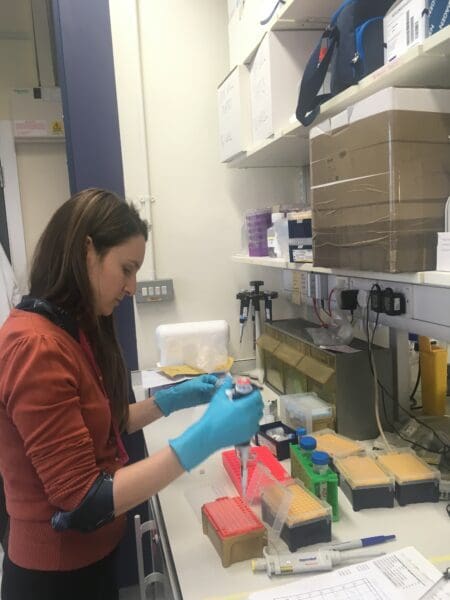Objectives
The Trust’s Vision is a world free of MSA – this is our aspiration and goal. We hope one day to find a cure for this devastating disease.
Our commitment to continuous funding demonstrates the importance we place on this area of the Trust’s work. It also reflects the wishes of our members as many have stated that MSA research should be an essential priority for the Trust and have supported our efforts with legacies and gifts to the Trust ring-fenced for research.
MSA is an extremely complex disease that is difficult to diagnose, and research to find the cause and ultimately a cure is equally complex and may take many years. However, every research project is one step closer towards realising our aim.
We focus on the following 4 objectives:
1. MSA Trust grant award programme
We focus on awarding grant funding to two key areas:
- Finding the cause of MSA. Despite many advances in this area over the last 30 years, the underlying cause of MSA remains unknown. Research into this area would greatly help our understanding of why people develop MSA, as well as identifying potential targets for a cure or treatments to slow down progression (disease-modifying treatments).
- Improving treatments for people with MSA through drug discovery and translational studies (bringing solutions from the laboratory into the clinic). While a cure remains a key focus of the MSA Trust, improving quality of life for people with MSA is a critical need, as currently many of the symptoms of MSA are disabling and hard to manage effectively.
2. Clinical Training Research Programme
Many of the key developments in MSA research have been led by clinician scientists with a good understanding of the clinical problems that face people with this disabling condition. This allows productive collaborations with basic scientists and other researchers to improve our understanding of what MSA is, how and why it progresses and how we can identify potential treatments. The MSA Trust firmly believe that supporting the development of the next generation of clinician scientists in this area is critical to the success of research in MSA.

3. Collaboration with pharma companies and other investigators to support development of therapies
Support for research teams to develop our understanding of MSA is critical to achieving our objectives of identifying a cure or disease-modifying treatment for this condition. However, we understand the importance of new symptomatic treatments for disabling aspects of the condition, given the many people living with MSA. Pharmaceutical companies play a key role in developing, testing and delivering these therapies, and the MSA Trust is committed to collaboration to help this process.
4. PROSPECT-M-UK study
The MSA Trust is proud to support the PROSPECT-M-UK study, which aims to establish biomarkers of progression in atypical parkinsonian syndromes, including MSA as well as progressive supranuclear palsy (PSP) and corticobasal syndrome (CBS). The study includes a natural history cohort, who are being followed up regularly over three or more years at seven core centres in the UK with a dedicated MSA clinical service. Participants are examined for using scores for MSA symptoms and have cognitive assessments at each visit. In addition, participants give blood samples, and a smaller number of people undergo lumbar puncture and MRI brain scans to try and identify features on these investigations that could help with diagnosis or monitoring of these conditions.
In addition, a cross-sectional cohort of the PROSPECT-M-UK study involves people with MSA and other conditions donating a one-off blood sample at hospital or their GP practice and filling in questionnaires about their condition. A new longitudinal cohort of the study are being followed up in similar detail to the natural history cohort, but over the course of one year.
This study aims to better characterize how conditions like MSA progress over time, and what markers may help us identify people likely to progress at different rates. These markers include clinical scores, findings on brain scans, or tests of blood or spinal fluid. PROSPECT has already led to high-profile publications in several neurology journals, including a description of the natural history cohort that included MSA patients. Further work is ongoing on the participants with MSA to determine markers associated with rates of disease progression.